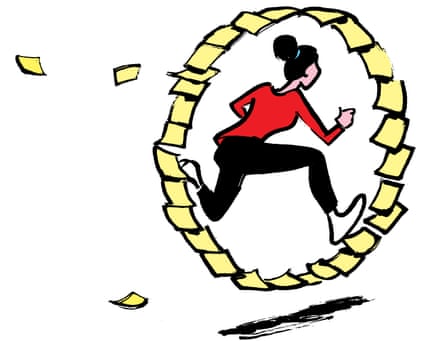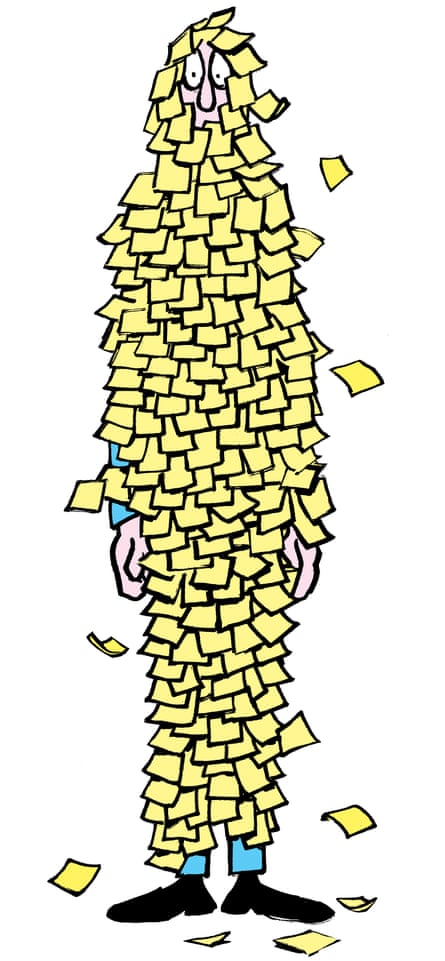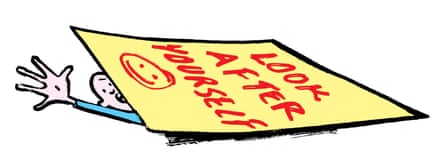When you stop to think about it, the strange thing about conventional new year resolutions – the big, ambitious, change-your-life-completely kind – isn’t that they never seem to work. It’s that we ever imagined they might.
Consider the situation. For one thing, you’re too busy (who isn’t?), so it’s not as though making time for several new daily habits is likely to prove straightforward. For another thing, you’re a good person, who generally seeks to do their best – so the fact that you’re not already working out thrice weekly, or meditating daily, or doing more to reduce your carbon footprint or organise your personal finances, isn’t for want of trying. There are reasonsthese behaviours haven’t proved easier for you. And now a resolutionis somehow going to change things? Good luck with that. “‘Resolving’ is just firmly telling yourself, ‘Next time will be different,’” says Jessica Abel, a creativity coach. It “makes you feel like you’re making a real change, when most likely you’re doing little more than wishing harder”. And then hating yourself even more when it all goes wrong – as it rapidly will.
Probe slightly deeper, and the idea of transforming yourself simply by very firmly deciding to transform yourself begins to look stranger still. Here you are, your familiar old self, with all your flaws and hang-ups, and you’ve concluded that it’s time for a New You. And yet the person overseeing this transformation – the person nominating the new habits, buying the self-help books, creating the daily progress charts to stick on the fridge – is, of course, the Old You. Which means that the specific changes you select, and the manner in which you pursue them, will invariably bear the hallmarks of their creator.

If you tend to take a self-punishing approach to eating, or to physical exercise, you’ll probably end up pursuing resolutions that unwittingly reinforce that tendency by vowing to pursue a more intense regimen than before, when what’s called for might be to ease up on the discipline and pay more attention to your intuitive sense of what’s right for you on any given day. Or if you’re a people-pleaser, you may resolve to get even better this year at staying in touch with friends, or phoning your ageing parents, when all that does is feed your people-pleasing. So you won’t end up changing at all – or at least not in the direction you’d hoped.
So perhaps it’s time instead to embrace the spirit of the “anti-resolution” – to decide to ask a little less of yourself in 2024, to choose deliberately tiny changes over more demanding ones, even to nominate things to stop doing entirely, once and for all.
Smaller resolutions are really only the first step. The next is to resolve to stop doing things entirely
The place to begin is with the recognition that tiny habit changes, and modest goals, are often more transformative than grandiose ones. For a start, it’s less intimidating to plan to, say, work on your novel for 10 minutes a day, instead of 90, so you’re less likely to call the whole thing off. But it’s also worth understanding that the sheer practice of sticking to something is far more important than the details of what you’re sticking to, especially in the early days of a new habit. Yes, a 10-minute writing practice is unimpressive compared with a 90-minute one. But the cult of so-called stretch goals has blinded us to the obvious truth that a 10-minute habit you actually perform is immeasurably more significant than a 90-minute one you dream up, get excited about, then abandon after a couple of days. Contrary to self-help cliche, the best question to ask when formulating such habits is often not, “How would I like my ideal day to look?” but rather, “What’s one daily action I’m truly confident I’ll do, even on my most insane days?”.

Not that “dailyness” is essential here, either. A rigid plan to do something every single day can easily become the kind of absolutist scheme that derails a habit change early on. I love the recommendation of the meditation teacher and podcaster Dan Harris that you should aim to meditate not daily but “dailyish” – a standard you can easily apply to other activities, too. Importantly, “dailyish” doesn’t mean letting yourself off the hook whenever you feel like it. Clearly, if you only go running or prepare healthy meals or practise your Spanish two days a week, you aren’t doing it dailyish. But four days a week? In some busy periods, that might count. The point is that you’ll know, intuitively, whether you’re keeping up the momentum or not – without being so inflexible that your plan collapses the first time your day runs out of control.
And yet smaller resolutions are really only the first step. The next is to resolve to stop doing things entirely. This is the practice that the late management expert Peter Drucker referred to as setting “posteriorities”, as in the opposite of priorities. Since your time is finite, and the potential ways to fill it are infinite, and setting a priority means deciding to use a portion of it on something – well, it stands to reason that something else must head to the backburner, or be abandoned entirely. That’s already the case, whether you like it or not; clarifying your posteriorities just means moving things to the backburner consciously and deliberately. A good place to start, Drucker liked to say, was by conducting an inventory of your activities and asking of each one: if I didn’t already do this, would I start now? If the answer is no – or even if it’s just ambiguous – that’s an excellent indicator of something that needs to be jettisoned.
And, just to be clear, you can expect this to feel extremely difficult. We’ve been conditioned to think of taking action as the bold and ambitious path in life, the one requiring courage and stamina, and to think of refraining from doing things as the path of the slacker. But the truth is that we live in a culture characterised by what social theorist Hartmut Rosa calls “dynamic stabilisation”, in which our world, and especially our economy, has to keep moving faster to survive – which translates, for individuals, into doing more and more. And so taking action often isn’t the bold path, but the one of least resistance. It’s opposing the pressure to take action that takes guts (as well as a modicum of privilege).
Yet in order to truly embrace the spirit of anti-resolutions, we need to go further. What about committing to spending a greater proportion of next year in sheer inactivity? In his fascinating recent book Vita Contemplativa, the German-Korean philosopher Byung-Chul Han makes the striking argument that it is inactivity, rather than activity, that gives human life its meaning, its value, and what he calls its “radiance”. He writes: “Without moments of pause or hesitation, acting deteriorates into blind action and reaction … Silence deepens conversation. Without stillness, there is no music – just sound and noise … If we lose the ability to be inactive, we begin to resemble machines that must simply function.”
Set a few modest goals, or maybe none at all; pull back from activities that no longer deliver meaning or joy. Cut yourself, and those around you, some slack
Moreover, especially when it comes to personal growth, action naturally lends itself to a focus on the future: you resolve to take up lifting weights, for example, becauseyou foresee a future situation in which you have lost weight, or feel less tired, or remain sprightly into old age. No harm in that – except that it too easily slides into a life spent exclusively focused on the future, looking forward to happiness and fulfilment at a point that’s never actually now.
By contrast, there’s no clear future benefit to be found in standing on top of a hill, looking at the view, or staring into the flames of an open fire, or reading an unchallenging but pleasurable work of fiction. From a future-focused viewpoint, that makes it a waste of time; but, in fact, it means you’ve found a moment of fulfilment in present reality, an actual moment of life well lived, instead of spending yet more time preparing for fulfilment later on. “If the satisfaction of an old man drinking a glass of wine counts for nothing,” wrote Simone de Beauvoir, “the production and wealth are only hollow myths; they have meaning only if they are capable of being retrieved in individual and living joy. The saving of time and the conquest of leisure have no meaning if we are not moved by the laugh of a child at play.”
Sign up to Inside Saturday
Free weekly newsletterThe only way to get a look behind the scenes of the Saturday magazine. Sign up to get the inside story from our top writers as well as all the must-read articles and columns, delivered to your inbox every weekend.
after newsletter promotion
It’s possible, though, you’re approaching this new year with the feeling that you really need to change – that all this talk of sauntering in nature or savouring a glass of wine might be all very well for most people, but that your life, at this specific moment, feels so chaotic or unhealthy or uninspiring that a major overhaul is essential. If so, it might be useful to ask the most radical personal-growth question of all, the one so potentially revolutionary it’s banned from almost every self-help book, course or app, and even from some approaches to psychotherapy: what if you never change? What then?
Naturally, this feels at first like giving up, settling for a far worse life than you could achieve if you really buckled down to it. But that’s an assumption worth questioning. As the psychotherapist Bruce Tift points out, there is something perversely rather convenient about telling yourself you’re a deeply messed-up person who requires a huge amount of improvement. He writes: “Claiming that we are problematic means we don’t have to engage with our lives fully, because we aren’t ‘ready yet’ – there’s something wrong that needs to be fixed first … [So] we have a good excuse not to show up. And it turns out that really showing up – being fully present, embodied, open-hearted – is often a very intense experience.”

Tift suggests asking yourself what it would feel like if you knew that the trait you find most objectionable in yourself, the one you’re always trying to change, would afflict you in some form to the end of your days. What if you’ll always struggle with your feelings about your weight, have a tendency to procrastinate, or find family life more draining than you feel you ought? For many people, giving up hope in this way proves unexpectedly liberating. In stepping away from the struggle that has come to define their lives, they feel more free to get stuck into activities they actually find meaningful, right now – and, ironically, often find it easier to change the issue that was bothering them, too.
There is a deep truth lurking here about the nature of change and growth – one that finds its most vivid expression in the Taoist concept of wu wei, usually translated as “non-doing”. It’s not really about doing nothing, though. It’s more about getting out of the way of action – taking the “doer” out of the picture, taking a less dictatorial approach to yourself and your surroundings, so as to let change happen naturally, without all the interference and psychological anguish we generally inject. The failure of conventional new year resolutions would hardly surprise a practitioner of wu wei. All those grand plans and strenuous vows to fix yourself were obviouslyalways going to complicate matters, leading to overreach or paralysis, then failure, despondency and a general downward spiral. You’re just as likely to be thwarted by trying too hard as by not trying hard enough.
So in 2024, consider dropping all that. Set a few modest goals, or maybe none at all; pull back from activities that no longer deliver meaning or joy. Quieten down. Cut yourself, and those around you, some slack. Stop demanding that you change. Ask what truly wantsto take shape in your life – and then let it.


 相关文章
相关文章




 精彩导读
精彩导读

 热门资讯
热门资讯 关注我们
关注我们
